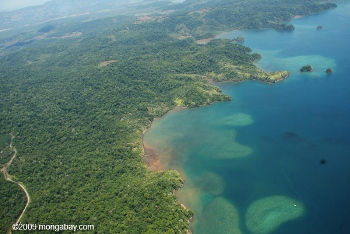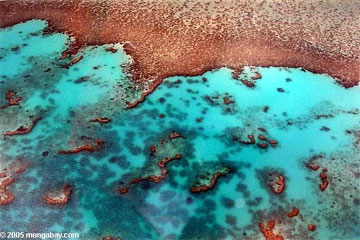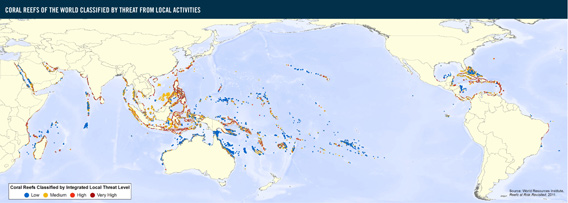Coral crisis: 75% of the world's coral reefs in danger
Jeremy Hancemongabay.com
February 23, 2011
Marine scientists have been warning for years that coral reefs, the most biodiverse ecosystems in the ocean, are facing grave peril. But a new comprehensive analysis by the World Resources Institute (WRI) along with twenty-five partners ups the ante, finding that 75% of the world's coral reefs are threatened by local and global impacts, including climate change. An updating of a 1996 report, the new analysis found that threats had increased on 30% of the world's reefs. Clearly conservation efforts during the past decade have failed to save reefs on a large-scale.
"This report serves as a wake-up call for policy-makers, business leaders, ocean managers, and others about the urgent need for greater protection for coral reef," said Dr. Jane Lubchenco, under secretary of commerce for oceans and atmosphere and NOAA administrator, in a press release.

According to the report, titled Reefs at Risk Revisited, 60% of the world's coral reefs are already impacted by local pressures, such as overfishing, destructive fishing practices such as using dynamite, coastal development, and pollution from both land sources and sea. Globally, coral reefs are imperiled by greenhouse gas emissions: coral bleaching from rising sea temperatures and ocean acidification due to higher carbon dioxide levels are hurting reefs worldwide. This double dose of local and global impacts will put 90% of world's reefs in danger in 20 years time, and close to 100% by 2050, if business continues as usual.
Southeast Asia coral reefs are currently the world's most troubled with 94% already imperiled by local impacts.
Priceless resource
Coral reefs are not just one of the world's most beautiful ecosystems, they also provide a wealth of ecosystem services for society. Reefs protect shorelines against storms and erosion, provide food security for some of the world's poorest, draw tourism, and provide habitat for a quarter of the world's marine species. Medicines for some of the world's worst diseases—from cancer to AIDs to malaria—have also been found among coral species.
"At their core, reefs are about people as well as nature: ensuring stable food supplies, promoting recovery from coral bleaching, and acting as a magnet for tourist dollars. We need apply the knowledge we have to shore up existing protected areas, as well as to designate new sites where threats are highest, such as the populous hearts of the Caribbean, Southeast Asia, East Africa and the Middle East," said Mark Spalding, senior marine scientist at the Nature Conservancy and a lead author of the report.
Reefs at Risk identifies the nine most vulnerable nations to economic and social problems stemming from coral reef loss: Haiti, Grenada, Philippines, Comoros, Vanuatu, Tanzania, Kiribati, Fiji, and Indonesia.

Great Barrier Reef in Australia.
"The people at greatest risk are those who depend heavily on threatened reefs, and who have limited capacity to adapt to the loss of the valuable resources and services reefs provide," explained Allison Perry, project scientist at the WorldFish Center and a lead author. "For highly vulnerable nations—including many island nations—there is a pressing need for development efforts to reduce dependence on reefs and build adaptive capacity."
Saving corals
The report is not all gloom and doom, but puts forward solutions to the coral crisis. Already a quarter of the world's coral reefs are already under some form of protection, however many of these are merely 'paper park's. According to the report 6% of the world's coral reefs are in marine protected areas (MPAs) that are considered well-managed.
Locally, overfishing needs to be halted as well as damaging fishing practices such as dynamite fishing; coastal developments must be better planned; and pollution reduced. In addition, MPAs should be expanded and management improved.
To save coral reefs, however, will also require tackling global climate change through cutting greenhouse gas emissions, particularly carbon dioxide which is causing ocean acidification, according to the report.
"Coral reefs are valuable resources for millions of people worldwide. Despite the dire situation for many reefs, there is reason for hope," said Lauretta Burke, senior associate at WRI and a lead author of the report. "Reefs are resilient, and by reducing the local pressures we can buy time as we find global solutions to preserve reefs for future generations."

.
http://news.mongabay.com/2011/


0 comments:
Post a Comment